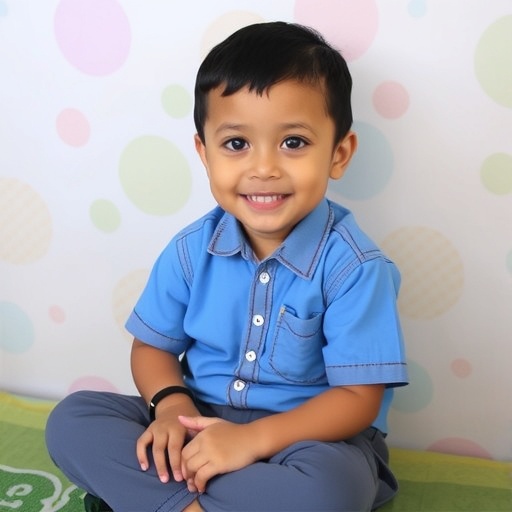In an era where early detection of cognitive impairments in children is paramount, researchers have made significant strides in developing reliable screening tools to assess cognitive function. A recent study led by a team of Indonesian researchers, including Handryastuti, Nursyamsi Agustina, and Sekartini, aims to validate and establish the reliability of the Mini-Mental State Pediatric Examination (MMSPE). This novel tool is designed specifically for Indonesian-speaking children, addressing a critical gap in the pediatric healthcare landscape where such culturally and linguistically appropriate assessments are necessary.
The Mini-Mental State Pediatric Examination (MMSPE) is a comprehensive tool that evaluates various aspects of cognitive function in children. Its creation stems from the growing need for effective screening instruments that can identify potential cognitive deficits early on, enabling timely interventions. In many parts of the world, including Indonesia, access to standardized cognitive assessments tailored to local languages and cultural contexts has been limited. The MMSPE seeks to bridge this gap, ensuring that children receive appropriate evaluations regardless of their linguistic background.
Researchers undertook a rigorous study to test the validity and reliability of the MMSPE. Validity refers to whether the tool accurately measures what it is intended to assess—in this case, cognitive function in children. The researchers meticulously compared the MMSPE results with established cognitive assessment benchmarks and conducted various statistical analyses to ensure that the tool performs well across different demographics and cognitive profiles. This thorough approach underscores the commitment to establishing a robust instrument that healthcare professionals can trust.
Reliability, another cornerstone of effective testing tools, pertains to the consistency of the MMSPE results over time and across different evaluators. To assess reliability, the researchers performed test-retest analyses, allowing them to determine whether repeated administrations of the MMSPE yielded consistent results. Furthermore, inter-rater reliability was evaluated, ensuring that different healthcare professionals could administer the exam with comparable outcomes. These efforts are crucial as they provide confidence in the tool’s effectiveness and ensure that its use in clinical settings will yield reliable data.
The unique aspect of this research lies in its focus on Indonesian-speaking children. Traditionally, much of the cognitive assessment literature and tools have been derived from Western contexts, potentially overlooking the nuances and specificities of other cultures. This can lead to misdiagnoses or oversight of cognitive impairments that may manifest differently across various populations. By prioritizing the development of the MMSPE, the researchers are addressing these disparities and enhancing the accessibility of cognitive assessments for children in Indonesia.
Moreover, the implications of the MMSPE go beyond individual assessments. The ability to detect cognitive issues early can profoundly impact broader societal health outcomes. Early identification of cognitive impairments allows for timely interventions, which can significantly improve a child’s developmental trajectory. This is especially vital in lower-resource settings where delays in diagnosis and treatment can lead to exacerbated challenges in education, social interaction, and overall mental health.
The study also highlights the importance of culturally relevant practices in healthcare. The MMSPE not only adheres to the linguistic needs of Indonesian-speaking children but also integrates elements pertinent to their cultural context. This sensitivity ensures that children feel more comfortable and understood during the assessment process, which can lead to more accurate results and, ultimately, better outcomes.
As the research findings are disseminated, there is anticipation surrounding the potential adoption of the MMSPE across various healthcare settings in Indonesia. Pediatricians and child psychologists would benefit greatly from a standardized tool that is proven to be both valid and reliable. Training programs for healthcare providers could be developed to facilitate the tool’s implementation, ensuring a wider reach and greater impact.
Furthermore, the study serves as a template for future research endeavors aiming to develop similar tools in other regions of the world. The methodology employed can inspire researchers working in diverse cultural contexts to create localized assessments that reflect the specific needs of their populations. This approach reinforces the notion that effective healthcare is not one-size-fits-all; it must be tailored to fit the cultural and linguistic realities of individuals.
In conclusion, the research conducted by Handryastuti and her team signifies a pivotal advancement in pediatric cognitive assessment within Indonesia. The validation and reliability of the Mini-Mental State Pediatric Examination provide a solid foundation for its adoption in clinical practice, ultimately contributing to improved healthcare outcomes for children. As the study gains recognition, it paves the way for more inclusive and culturally sensitive approaches in the field of pediatric mental health, ensuring that all children, regardless of their background, have access to the care they need.
Subject of Research: Development and validation of the Mini-Mental State Pediatric Examination (MMSPE) for assessing cognitive function in Indonesian-speaking children.
Article Title: The validity and reliability test of the mini-mental state pediatric examination (MMSPE) as a screening instrument for cognitive function in Indonesian-speaking children.
Article References: Handryastuti, R.A.S., Nursyamsi Agustina, N., Sekartini, R. et al. The validity and reliability test of the mini-mental state pediatric examination (MMSPE) as a screening instrument for cognitive function in Indonesian-speaking children. BMC Pediatr 25, 877 (2025). https://doi.org/10.1186/s12887-025-06021-9
Image Credits: AI Generated
DOI: 10.1186/s12887-025-06021-9
Keywords: Mini-Mental State Pediatric Examination, Cognitive Function, Validity, Reliability, Pediatric Assessment, Indonesian Children.




